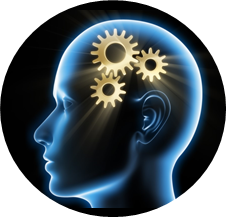

The Second Factor of Achievement

You may also have documented some unresolved issues that are acting as brakes in your life.
The key to understanding if the past maintains a hold over our life is in how we respond with our "emotions" and "feelings" in present day circumstances.
When we experience negative emotions of any kind, e.g. hate, anger, jealousy, worthlessness, embarrassment, victimization, sadness, desperation, fear, etc. our reactions are response styles that we learned in our past.
This is called "Unconscious Feedback" which means an issue remains incomplete.
"Like a dead cat that was swept beneath a carpet and festered" the unconscious emotional response will continue to resurface in an ever escalating fashion until completed. "Unconscious Feedback" is also known as the Inner Viking who we will discuss in later programs.
How Does Incompletion Act as A Brake?
How Does Incompletion Act as A Brake? A good example of how experiential learning works is when we first slammed our fingers in something (a door, draw e.g.) as a child. The unconscious seemed to make its own decision "I'll never do that again" and carefully guided our innocent fingers away from the next big slam.
All sorts of scenarios can end up as unconscious brakes, e.g. "I'm hopeless with money", or "Without a partner I am no-one", or "They always rip me off" or "I failed at that ... so I shan't try that again."
An achiever cannot operate effectively in life with brakes on, but often does not know they exist!
The climb towards achievement means stepping out of our comfort zone into areas that will challenge us emotionally, because we will be facing many of our unconscious limiting beliefs.
Tina said "My parents always told me I was hopeless with money and I believed them. I stayed believing that I could never be powerful with money, until after doing the Completion Exercise, I realised it wasn't the truth. I was able to re-educate myself with a firm decision to be powerful with money."

"Interdependence" is one of those new psychology buzz words which is extremely hard to pin down in a dictionary and is best understood by becoming aware of the opposite characteristic known as "Co-dependency". [Dictionary Explanation: Co-dependency = A relational pattern in which a person attempts to derive a sense of purpose in relationships with others and things.]
Co-dependency is an 'unconscious' state of being where, like children, we remain dependent upon circumstances and relationships to determine who we are and how we conduct our lives. When we operate within co-dependent confines, we rely upon the opinions and beliefs of others for our happiness and self-esteem.
When we allow another person or group's behaviour and beliefs to modify our own, we are permitting ourselves to be brainwashed.

Forgiving the Unforgivable
Some of us have experienced life shattering devastation and cruelty as children or adults. We were betrayed by the unspeakable actions of those we relied upon for love and our self concepts. Some experiences were so horrific, they do not deserve forgiveness morally or legally, but to release our brakes completely, forgiveness must be our major definite purpose.
The inability to forgive the past keeps us in a state of non-completion and that is co-dependent. The ability to forgive is vital to achievement, or we will travel through life with bitter brakes on.
We are only psychologically healthy to the degree that we can forgive.
Interdependent relationships are "mutually dependent", i.e. free of expectation, preconceived notions or domination and takes responsibility for issues and reactions.
Co-dependency finds outside sources to blame for situations and circumstances keeping us on a merry go round.
Your Reality Or Theirs?
Interdependence is recognizing that all humans have "realities" that are not necessarily the same as our own and not applying any wrong or blame to those viewpoints, even though we are not required to agree.
The Interdependent Achiever sees beyond the "group think" and "sheep factors" of cultural, community, religious, family and career networks to bring unbiased integrity and values to the group.
Entire communities can be brainwashed into society beliefs which explains wars and genocide.
Co-dependency shows up in modern Western society, particularly through the beliefs and perceptions depicted by the media. Unfortunately, media is a marketing machine and success is measured by ratings.
A constant stream of stories of tragedy and horror not only attracts viewers and ratings, but mesmerises the general public about the world we live in.
Challenging the Group Think
Interdependence can mean challenging group think.
Galileo was jailed for over 20 years by the Catholic Church because he believed the world was round! Nelson Mandela was also jailed for his convictions towards ending Apartheid.
The Achiever must be prepared to stand up for their ideas, particularly in the face of adversity.

Journal Time

The Interdependence Exercise.
Take up your journal to conduct the following exercise, where you will become aware of where you allow (or you "think" you allow) people and circumstances to control your thoughts, feelings and actions.
Make a list of all the people presently in your life, e.g. your parents, guardians, spouse, children, other relatives, friends, lovers, work associates, clients, teachers and peers.
Ask yourself the following questions then journal the replies:
a. Do I feel I must behave in a certain way to make this person happy, or to love, like and respect me?
b. Does this person feel they must behave in a certain way to make me happy, or to love, like and respect him/her?
c. Do I put any conditions or expectations on the relationship? (e.g. I'll do this if you ....)
Let us now move to the Third Factor of Achievement ~ PERCEPTION